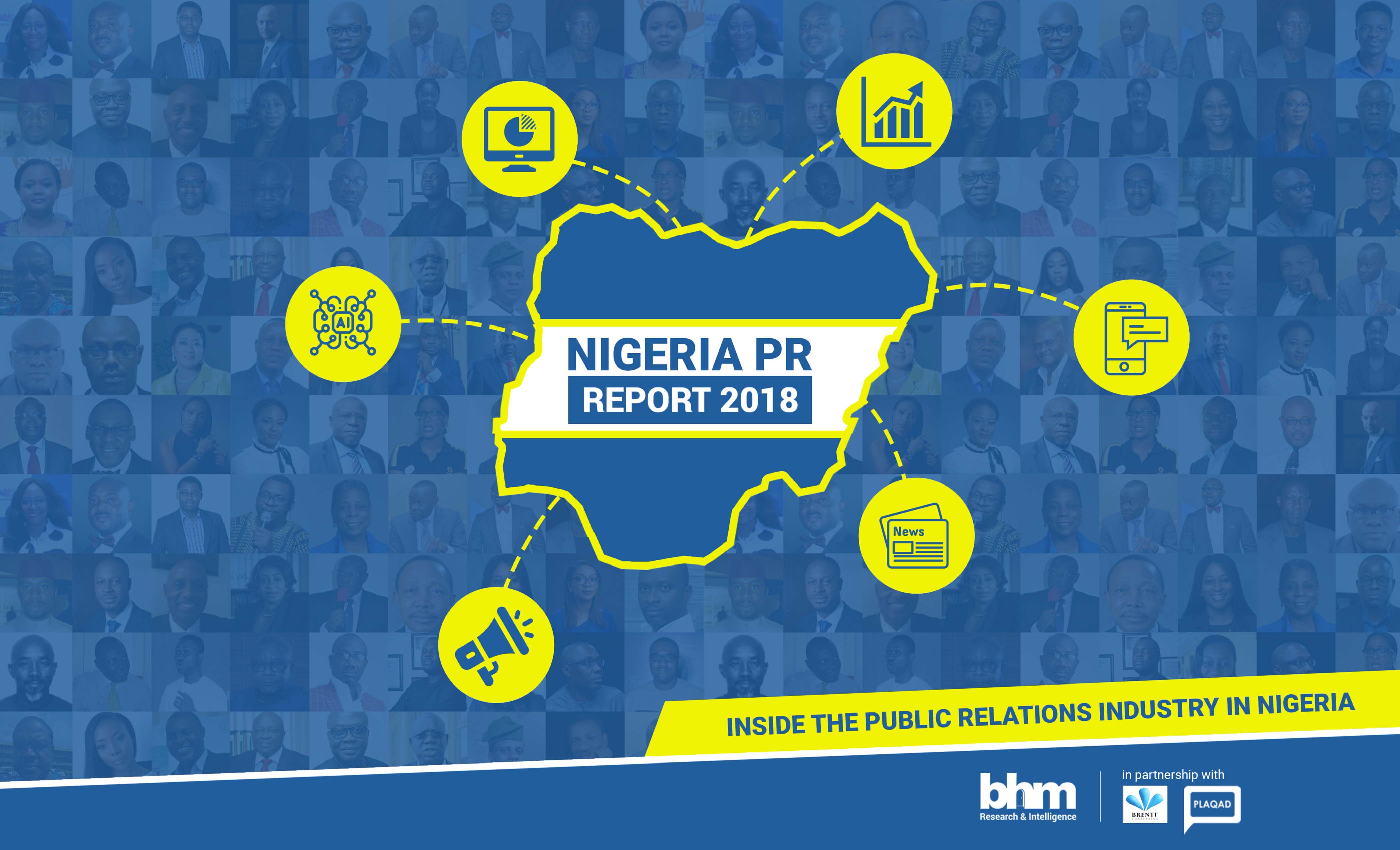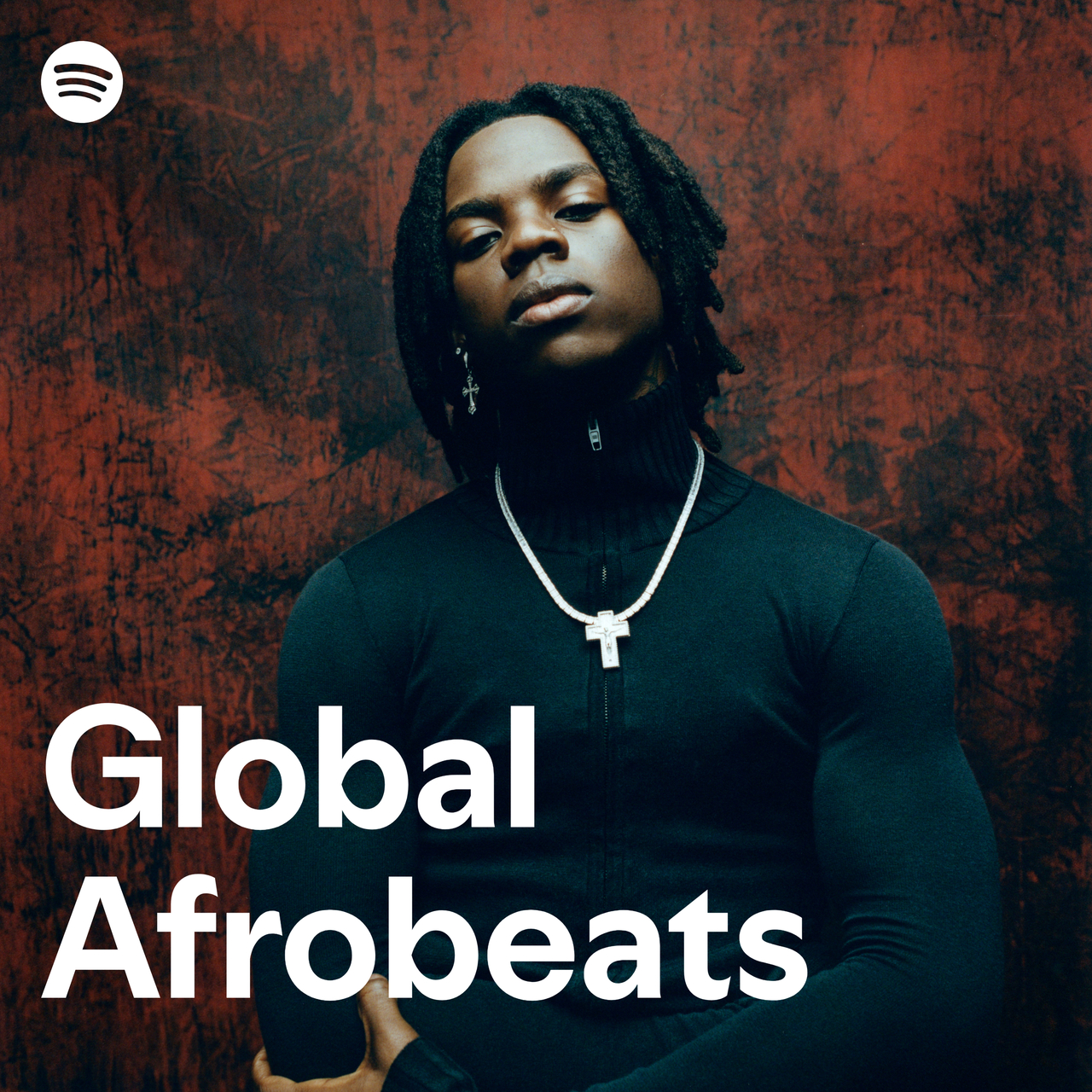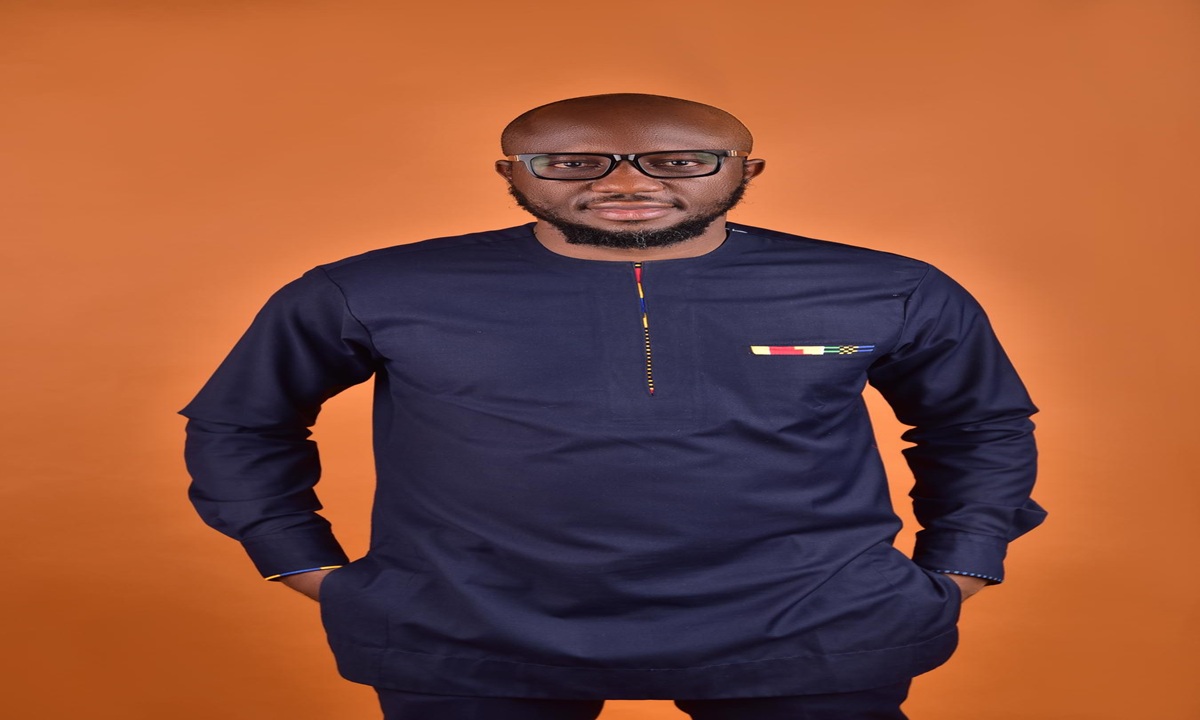Broadcasting
Nigeria PR Industry Witnessed 20% Drop in Profitability- According to Report

The Nigerian PR Industry has been suffering from a slow decline in profitability, as competing practices continue to encroach on the public relations space.
This and other revealing data are contained in the third edition of Nigeria PR Report, issued today in Lagos, Nigeria’s commercial capital, and the city with the most concentration of PR consultancies in the country.
Published by BHM Research and Intelligence, the 2018 Nigeria PR Report, records a 20% drop in respondents’ assessment of profitability in PR and a 33% increase in the number of respondents who think profitability is dwindling, reaffirming the fact that PR is mostly the first casualty when companies initiate a cost-cutting exercise.
Dwindled PR spend caused by the 2016/17 economic recession in the country manifested in the profitability of PR businesses.
‘The state of affairs has been driven largely by currency volatility, macro-economic shocks and policy issues with big spenders like MTN and Etisalat (now 9Mobile) in the Telecom sector, the Unilevers and the P&G’s in the FMCG sector crawling back with consequent squeeze on the local PR industry”, says Bolaji Okusaga, one of the key respondents whose think piece is also featured in the report.
The report, which gathers and analyses data on trends, perceptions, challenges and prospects within the industry, is a joint product of the BHM Research team and Brentt Consulting, one of Nigeria’s most respected market research companies.
Since its inaugural publication in 2016, PR industry stakeholders – practitioners, clients, investors, regulators, media and students – have come to look forward to the annual release of the report due to the useful insights that the report offers.
As in previous editions, the 2018 Nigeria PR Report looks at current trends, backed up by both quantitative and qualitative analyses.
Also, this year’s report is a product of online surveys, focus group discussions and individual interviews covering key stakeholder groups like agency CEOs, PR consultants, media practitioners and clients being served by PR experts.
The facts are presented in a reader-friendly format, employing infographics in data presentation for better understanding.
Over 400 practitioners were surveyed, over a period of 4 months. At least 25 professionals participated in focus group discussions.
Expert opinion articles were collected from Nigeria, South Africa, Canada, the United Kingdom and the US.
The 2018 edition is divided into seven sections covering various areas of interest – Research Findings,, Perspectives on Improving Nigeria’s PR Industry, Ethics and Professionalism in PR in Nigeria, Regulatory Bodies of Nigeria PR industry, Measurement in Public Relations, Perspectives from the Global PR Industry and a directory of Public Relations Agencies in Nigeria.
The first section of the report, Research Findings, is further divided into two parts of industry overview and state of Nigeria’s PR industry.
This section is a hugely quantitative presentation of industry facts and figures. It highlights a trend that more agencies in the country are recording some increase in their annual revenue.
The data shows that only 14% of agencies were billing below N5 million annually in 2017, compared to the 33% recorded in 2015.
The report noticed a 166% rise in the number of agencies who recorded annual revenues of N6 – N10 million between the 2015 and 2017 data.
There was also a 58% increase in the number of agencies who earned N150m and above, when comparing the 2015 and 2017 figures.
However, the report shows there were drops in the numbers of agencies whose annual revenue bands were N11m – N20m (9%), N21m – N50m (16%) and N100m – N150m (42%) between the years 2015 and 2017.
Overall, the report indicates that mid-sized agencies (billing-wise) did not have it as rosy as their micro- and mega counterparts.
It also highlights the fact that alcoholic beverages, with approximately 200% increase over its standing in 2016, upstaged the banking/finance, which dropped by 11 percent, telecoms (with a 38% drop) and manufacturing (even with a 15% increase) in the sectors serviced in 2017.
Over 80% of respondents checked digital/social media marketing as the most sought after/offered service in the Nigeria PR industry.
The reason may not be unconnected with the ease of measuring digital media results. Calculating reach, impressions and engagement on social media and online platforms is easy and the numbers are considered more accurate than those of traditional media.
“Digital and social media channels provide the platform for engagement and advocacy amongst a youthful, tech-fuelled population and with that comes the reputational challenges of a society that now has the power to communicate in real-time with its global ‘neighbours’.
“Now, more than ever before, PR professionals are under pressure to be more thoughtful, more creative and focused on delivering value for their clients.
“What makes a PR person different from the regular ‘tweet’ is their ability to bring to bear the traditional principles of PR in a technologically sophisticated communications terrain,” specialist in Strategic PR, Media and Reputation Management, Moliehi Molekoa, reiterates in the report’s foreword.
On PR Spend, the report indicates that most micro-, mini and mid-sized companies avoided PR agencies in 2017, leaving the space for mostly the large companies.
The data shows that companies whose PR Spend were in the bands of N0 – N5m, N6m – N10m, in 2015 did not engage PR agencies for the year 2017.
Those companies whose bands are N11m – N20m and N51m -N100m recorded a 25% increase in the PR Spend in 2017.
The disposition of communication managers in corporate organisations towards PR is the reason PR is the most hit of all companies’ supplies items in times of cost rationalisation.
This disposition even manifests more in these managers’ perception of the PR landscape as highlighted in the report.
There is almost a general consensus that the landscape is declining, with the group of respondents who are of the view that the landscape is improving dropping by 26%; those who said it is deteriorating increasing by 33%, while those who said it remains the same had also increased by 10%.
According to 70% of respondents, the skills required for success in PR are business, content and storytelling while 62% are of the opinion that creative thinking is important and 55% propose that media relations is equally important.
The report offers perspectives on improving the Nigeria’s PR industry, authored by some of the industry’s bests.
Bolaji Okusaga, a PR and communications strategist in his paper titled, Precise Projections On The Nigerian PR Industry In 2018, highlighted the performance of PR in 2017 and posited that “2018 promises to be brighter and better, given the obvious recovery of the economy and a projected increase in government and political spending being a year before the general elections.”
Nkiru Olumide-Ojo, an integrated marketing communications professional, in her article, PR: What Clients Want, highlighted some of the attributes that clients expect from their agencies.
These attributes include increased stakeholders reach, creativity and innovativeness, pedigree and good track record, professionalism, clear understanding of clients’ business, quick turnaround time, among others.
In her words, “there’s a lot that goes into being a successful PR consultancy or consultant.
“And while everyone takes a unique path, there’s one prerequisite that stands in the way of becoming successful: You have to possess a weighty understanding of who you are and what you bring to the table.
“In order to help others, you need to be acutely aware of your strengths, weaknesses, past experiences, and future aspirations and limitations.”
Ikem Okuhu, an editor of a brand publication reviewed the relationship between the PR agencies and their media partners.
In his article, Media and PR: Reviewing the relationship between two sides of same coin, Okuhu called on PR practitioners and the media men to dialogue and renegotiate how news stories should be treated, as most of the items PR practitioners pass off as earned media should actually be paid media.
Femi Falodun, a Marketing and Digital Communications Consultant, in his article, How ‘Influencers’ Are Killing Agencies and Why Clients Enable Them, advises brand managers, who run to social media influencers instead of PR agencies to promote their brands, to ensure that these influencers “really deliver value in terms of sales growth, marketing ROI, consumer behavioural change, brand recall and TOMA — the real outcomes that matter, and not just vanity metrics of Likes and Impressions.”
In his treatise, Moruff Adenekan, Marketing Communications and Reputation Management professional, also focuses on influencer marketing, expressing regret that some clients are beclouded by the sheer number of social media following of paid influencers, instead of first ascertaining whether these followers actually believe in them.
Although the report is billed to focus on Nigeria’s PR industry, there is the conscious fact that our local PR industry is not an island on its own but is also a part of the global PR industry.
This prompted the dedication of a section of the report to important perspectives on the global PR industry, which offers insightful articles by renowned practitioners on the trends of PR on the world stage.
Like the previous editions, the Nigeria PR Report 2018 is truly a collector’s item for all PR stakeholders, both in Nigeria and outside our shores.
It fills in for the omission of our local landscape in the Global PR Report, whose major focus is the top 250 agencies around the world, which unfortunately no agency in Nigeria currently belongs.
It is very informative, thrilling and presented with the reader in mind.
Broadcasting
Tinubu Recalls Dembos as DG NTA, Nullifies Fresh Appointments

President Bola Ahmed Tinubu has ordered the reinstatement of Mr Salihu Abdullahi Dembos as director-general, Nigerian Television Authority (NTA).

The directive was contained in a statement issued on Tuesday by Bayo Onanuga, special adviser to the President on Information and Strategy.
Onanuga explained that Dembos, who briefly vacated the position following management changes at the agency, was appointed by President Tinubu in October 2023 and will now return to complete his three-year tenure.
Also recalled is Mr Ayo Adewuyi, executive director of News, who was appointed in 2024. He is to serve out his tenure, which runs until 2027.
According to Onanuga, the directive nullifies the earlier appointments of a new director-general, executive director of news, executive director of marketing, and managing director of NTA Enterprises.
Broadcasting
Spotify Unveils Global Afrobeats Playlist, Celebrates Genre’s Worldwide Rise

To amplify Afrobeats’ status as a global powerhouse, Spotify today announced the launch of its new Global Afrobeats Playlist. The new Global Afrobeats Playlist is a celebration of a sound that has moved from the club to the charts and beyond, influencing global fashion, dance, and culture. In direct response to the genre’s global growth, this playlist is driven by the passion and influence of listeners worldwide.

Beyond Africa, Afrobeats is seeing a massive increase in Asia, with Indonesia, India, the Philippines, and Thailand becoming major hotspots. In 2020, these markets experienced significant growth: Indonesia at a 4,530% increase, India at 1,650%, the Philippines at 1,492%, and Thailand at 1,370%. The genre’s popularity in the Latin America region has also seen a remarkable 183% year-on-year growth in 2025, underscoring its broad and international appeal.
Interestingly, Spotify data reveals a 135% growth in the number of user-generated playlists that use “Afrobeats” between 2020 and 2025. This is a movement of fans acting as tastemakers, building the genre’s global footprint one playlist at a time. Listeners are not just consuming the sound; they are curating, sharing, and exporting it worldwide.
This digital takeover is the work of a new generation. Gen Z, with an appetite for new sounds, has made playlists their go-to for discovery. They have turned playlists like Hot Hits Naija, African Heat, and Gbedu into global gateways. These playlists are the top three playlists for young Afrobeats listeners globally, reflecting the genre’s diverse energy, from club anthems to smooth crossovers. Hot Hits Naija alone has pulled in over 20 million global plays.
The top three playlists shaping Gen Z listening in the genre’s birthplace, Hot Hits Naija, Gbedu, and Street Energy capture the raw, street-driven pulse of Nigerian youth culture. The Afro Adura playlist, for instance, saw its average monthly plays jump by 51%, a clear sign that the genre’s appeal is both broad and deep.
“The launch of our Global Afrobeats Playlist isn’t about Spotify leading the charge, it’s about us following the fans,” says Benewaah Boateng, Spotify’s Senior Music Editor, Sub-Saharan Africa. “The data shows a wave of listener-driven curation, and this playlist is our way of celebrating that momentum. We are simply giving due recognition to the voices of a new generation who have made Afrobeats a global force, and we are thrilled to provide a definitive home for this vibrant and ever-evolving genre.”
The new Afrobeats Global playlist is a nod to the fans who built this movement from the ground up, and a green light for Afrobeats to keep climbing.
Broadcasting
RoW Waiver: The Hidden Backbone of Anambra’s Digital Revolution

By Chukwuemeka Fred Agbata, CFA
Across Nigeria, one of the biggest hurdles to broadband expansion has been the prohibitive cost of Right of Way charges: the fees telecom operators must pay to lay fibre-optic cables across state-owned land, which drastically slows down digital infrastructure rollout.

In 2022, one of the earliest and boldest steps taken by Prof. Charles Chukwuma Soludo, CFR, was the removal of the Right of Way (RoW) charges for laying broadband fibre across Anambra State.
At the time, it may have seemed like a quiet policy move, but in reality, it laid the foundation for the state’s ongoing digital transformation journey.
The logic behind this move is simple but powerful. By waiving RoW charges, the administration sent a clear message to telecom operators, broadband providers, and investors: Anambra is open for digital business.
This single decision has paved the way for fibre-to-home deployment, the expansion of 5G infrastructure, and faster, more reliable internet across communities, ultimately boosting the ease of doing business.
Perhaps one of the most visible testaments to this visionary policy is the ongoing roll-out of the “Solution Free Wi-Fi” initiative, which is democratizing internet access for students, traders, civil servants, and everyday citizens, alongside the digitization of government processes that are making service delivery faster and more transparent.
Anambra is reaping the dividends of a forward-thinking approach.
What seemed impossible a few years ago is now a lived reality: Teachers are being equipped with digital tools, enhancing lesson delivery and preparing students for a technology-driven future.
Civil servants now work with smarter systems, making the civil service more efficient, transparent, and responsive to citizens, while young innovators are finding an enabling environment to create solutions and businesses that improve lives and shape the future.
What began as a policy shift has cascaded into practical, people-centred benefits that are redefining how Anambra learns, works, and governs.
This backbone is also unlocking new opportunities in telemedicine, e-learning, smart agriculture, and more. In short, the Soludo-led administration’s decision aligns perfectly with the governor’s vision of building a liveable and prosperous megacity, anchored on technology.
More notably, Anambra’s forward-thinking move aligns it with both national and global best practices. In Nigeria, states like Lagos, Ekiti and Kaduna that reduced or eliminated RoW fees saw significant surges in broadband penetration and digital services. Internationally, countries like Kenya and Rwanda demonstrate how lowering barriers for telecom operators fuels widespread connectivity, attracts investment, and spurs innovation.
Anambra’s decision places it firmly within this league of forward-looking regions, positioning the state as not just a beneficiary of technology but a driver of digital growth in Nigeria.
This is not just about cables in the ground, it’s about creating an ecosystem where technology thrives and opportunities multiply.
Anambra is proving that the future truly belongs to states that embrace technology not as a slogan, but as a strategy.
The state’s journey toward becoming a digital hub in Nigeria is still unfolding, but the foundation has been laid, strong and unshakable, by a single, daring choice.

 Telecom2 days ago
Telecom2 days agoMTN Nigeria Empowers over 3,000 Customers with ₦579m in Mega Billion Promo

 News2 days ago
News2 days agoSuri’s Memoir Sparks Visionary Dialogue with Zimbabwean Ministers on Africa’s Future

 E-Financial2 days ago
E-Financial2 days agoUnion Bank of Nigeria Completes Merger with Titan Trust Bank

 E-Financial2 days ago
E-Financial2 days agoAMMBAN Faults CBN’s 60-day Deadline on PoS Geo-Tagging

 News2 days ago
News2 days agoAdlantique Named Nigeria’s Best in Digital Marketing, Content Creativity @ 2025 Beacon of ICT Awards

 General News2 days ago
General News2 days agoAirtel Africa Foundation Presents Nigerian Students with Tech Scholarships

 General News2 days ago
General News2 days agoCAC Postpones New Fee Implementation

 Telecom2 days ago
Telecom2 days agoSwitch Solutions to Lead Cybersecurity Innovation @GITEX Nigeria 2025















